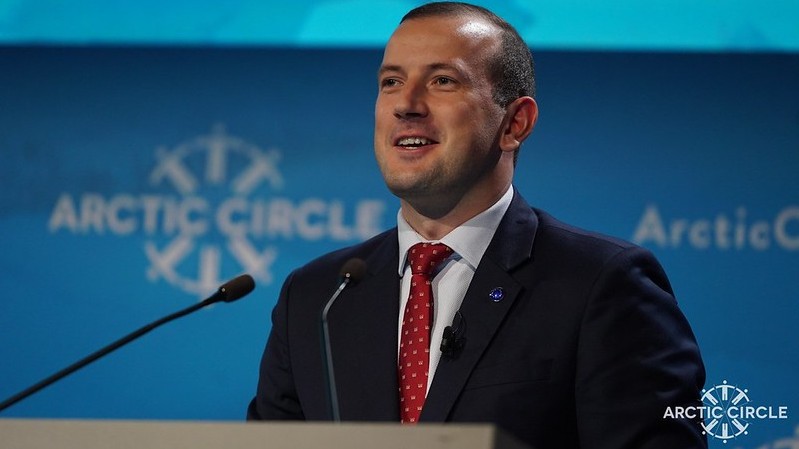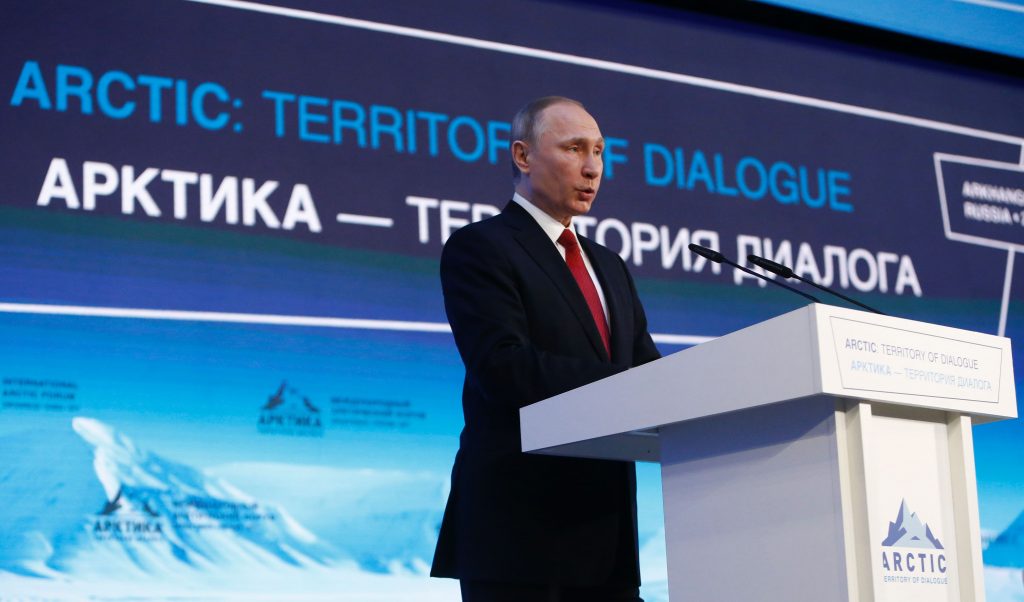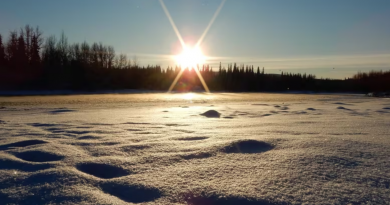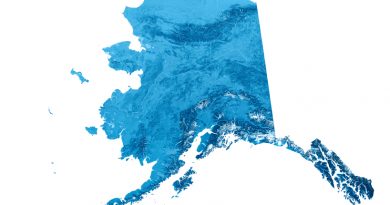Blog: Red light, green light – The European Union upgrades its Arctic policy

As the field of Arctic foreign policy continues to expand, the European Union has often found itself being the odd one out.
The EU’s membership includes Arctic states Denmark (via Greenland), Finland and Sweden, as well as several non-Arctic governments which have developed extensive polar interests, including France, Germany, the Netherlands and Poland. However, the Union itself has continued to search for its place in the Arctic, including seeking, (as yet unsuccessfully), a formal observer role in the Arctic Council.
The EU has now focused on the Arctic as an area of emerging policy importance due to the region’s developing economic, political and strategic aspects. With the release this month of the Union’s latest Arctic policy, the organisation has expressed its interest in engaging the Arctic, including with the aim to address regional climate change challenges. However, the document was not without its controversies, most of which involving the question of how ‘Arctic’ the EU actually is.
There are three main takeaways from ‘A Stronger EU Engagement for a Peaceful, Sustainable and Prosperous Arctic’ [pdf]. First, the Union sees itself as within the Arctic, and that although the Arctic states themselves have the ‘primary responsibility’ of addressing the problems facing the far north, many of these challenges extend far outside of the Arctic and so multilateral cooperation is a necessity.
With the argument in the document that local and regional actors cannot address the concerns of the Arctic alone, the paper argues that ‘the EU’s full engagement in Arctic matters is a geopolitical necessity’. With that, the Union joins a growing number of governments, including the European non-Arctic states listed above, as well as others such as China, Estonia, India, Ireland, Japan, South Korea and Singapore, which have identified themselves [pdf] to varying degrees as current or future Arctic stakeholders, underscoring the rapidly blurring line between ‘Arctic’ and ‘non-Arctic’ in regards to matters of governance.
The paramount threat
The second point is that the EU has identified climate change to be the paramount threat to the region, with global warming contributing to cascade effects which include accelerated loss of sea ice and permafrost, changed weather patterns, rising ocean levels, and dangers to local ecosystems; all of which have profound effects well beyond the Arctic itself. To face these challenges, the paper called for expanded research and education initiatives, and greater cooperation with non-EU Arctic actors Iceland, Norway and Russia as well as Greenland, while noting the relevance of the Union’s ‘Fit for 55’ policy programme of cutting EU greenhouse gas emissions by fifty-five percent between now and 2030.

Another environmental initiative which generated considerable discussion, and at times derision, was a call to ‘push for oil, coal and gas to remain in the ground’, including in the Arctic, in order to combat climate change. The EU is now pressing for a halt to future fossil fuel exploration in the far north on environmental grounds, adding to the partial moratoriums placed on Arctic oil and gas activities by Canada and more recently by the Joe Biden government in the United States and the government of Greenland.
To say that fossil fuel policies in the Arctic are in flux would be a significant understatement. After testing new price lows at the start of the global pandemic in early 2020, the current, albeit erratic, economic recovery in many parts of the world has placed strains on both supply chains and fuel stores, leading to concerns about an probable energy shock. With global oil prices now hovering at US$85 a barrel, garnering support for a longer term halt to Arctic fossil fuel drilling may be a much more difficult sell at this time, especially to Arctic states which have a strong reliance on oil gas for their recovering economies.
EU proposal out of step?
Unsurprisingly, Russia was less than enthusiastic about the EU proposal, given the importance the government of Vladimir Putin has placed on developing its Arctic oil and gas industries in anticipation of growing world demand. Speaking at the Russian Energy Week (Российская энергетическая неделя) event in Moscow this month, President Putin alluded [in Russian] to the energy supply issues facing much of Europe this autumn and referred to the EU proposal as political in nature and out of step with the current state of energy demands. Russian Deputy Prime Minister Alexander Novak also publicly dismissed the EU plan as both politically motivated and unworkable.
Moreover, Moscow had announced last month that it would be expanding its oil and gas exploration into additional parts of Siberia, with many of the country’s northern communities banking on future prosperity as the Russian Arctic prepares for new energy, transportation and infrastructure projects.
Counter to Norwegian economic interests
Some in Norwegian policy circles were also unimpressed with the EU’s proposed Arctic fossil fuel ban, with one editorial [in Norwegian] describing the Union’s proposed ban as running counter not only to Norwegian economic interests but also those of the United States and Russia. The timing of the EU’s Arctic paper was also significant for Oslo, given that the incoming minority government of Prime Minister Jonas Gahr Støre had announced [in Norwegian], at about the same time as the EU plan had been released, that oil and gas would continue to be a major part of the country’s economic policies, albeit in line with commitments [in Norwegian] to reducing carbon emissions.
This stance put an end to much pre-election speculation that an incoming centre-left government coalition led by Mr Støre’s Labour Party would seek to reduce Norwegian fossil fuel extraction due to environmental concerns. Attempts by Labour and the Centre Party to form a majority coalition with the Socialist Left Party (Sosialistisk Venstreparti / SV), which is strongly in favour of reducing carbon emissions, were scuttled over the oil issue earlier this month.

Heiðar Guðjónsson, Vice-Chair of the Arctic Economic Council, also expressed scepticism about the viability of the moratorium proposal, commenting at the recently concluded Arctic Circle conference in Reykjavík that it would have a negative effect on overall regional investment plans. Also at the Arctic Circle event, Virginijus Sinkevičius, the EU’s Commissioner for Fisheries, Oceans and the Environment, spoke [video] about the paper, framing the proposal to end oil and gas development in the European Arctic as a case of leading by example, with the hopes that other parts of the Arctic will consider similar steps. With the EU proposal published, the next step will be ratification by the organisation’s twenty-seven member governments.
Pressure from various parties continues to be applied, including in the wake of the recent report by the Intergovernmental Panel on Climate Change (IPCC) and the upcoming COP26 climate summit in Glasgow, to address the looming threat of climate change in the Arctic by implementing stronger measures to curb fossil fuel emissions. However, the EU paper has further illustrated what could be developing policy split within the Arctic over the role of oil in the region’s economic future.
‘Enhanced safety and security systems’
The third aspect of the EU’s paper was the acknowledgement that, despite general reservations in region about bringing security policy into Arctic policy dialogues, expanding economic and scientific interests in the Arctic requires ‘enhanced safety and security systems’. The document described the growing role of NATO in the Arctic, as well as EU interests in closer cooperation with the alliance, as well as the problems caused by Russia’s ‘increased assertiveness’ in the region and the engagement of non-Arctic actors, including China, in the far north. In addition to acknowledging the growing number of governments outside of the far north which have been seeking formal observer roles in the Arctic Council, the paper confirmed that the EU would also try again to seek that status.
While most of the EU’s policy document focused on civilian security fields, such as search and rescue and crisis responses, there was also the mention of ‘political-military elements’ which, in addition to environmental and economic concerns, needed to be included in the Union’s evolving ‘strategic foresight’ in the Arctic.
With this policy paper, the European Union has clarified that it seeks to widen and deepen its role in the Arctic in anticipation of ongoing climate change threats but also the rapidly-evolving political and strategic situation there, as the field of Arctic politics becomes more crowded, and at times more unpredictable.
Related stories from around the North:
Canada: Bennett out, Miller in on Crown-Indigenous Relations portfolio as Trudeau announces new cabinet, Eye on the Arctic
Finland: New Finnish chair of Barents Council highlights climate challenge, The Independent Barents Observer
Greenland: Greenland, Denmark and the Faroe Islands sign terms of reference for committee on foreign affairs and defence, Eye on the Arctic
Iceland: Nordics should aim for common approach to China’s Arctic involvement says report, Eye on the Arctic
Norway: Norway’s new government highlights fight against climate change and continued oil drilling, The Independent Barents Observer
Russia: Lavrov’s call for security consultations with Norway was followed by strategic bombers, The Independent Barents Observer
Sweden: Big blow for Barents Council as Swedish FM skips meeting with Lavrov in Tromsø to host NATO seminar, The Independent Barents Observer
United States: Norway ambassador visits Alaska to talk climate, Russia and, yes, Norwegian dog mushing success, Alaska Public Media



